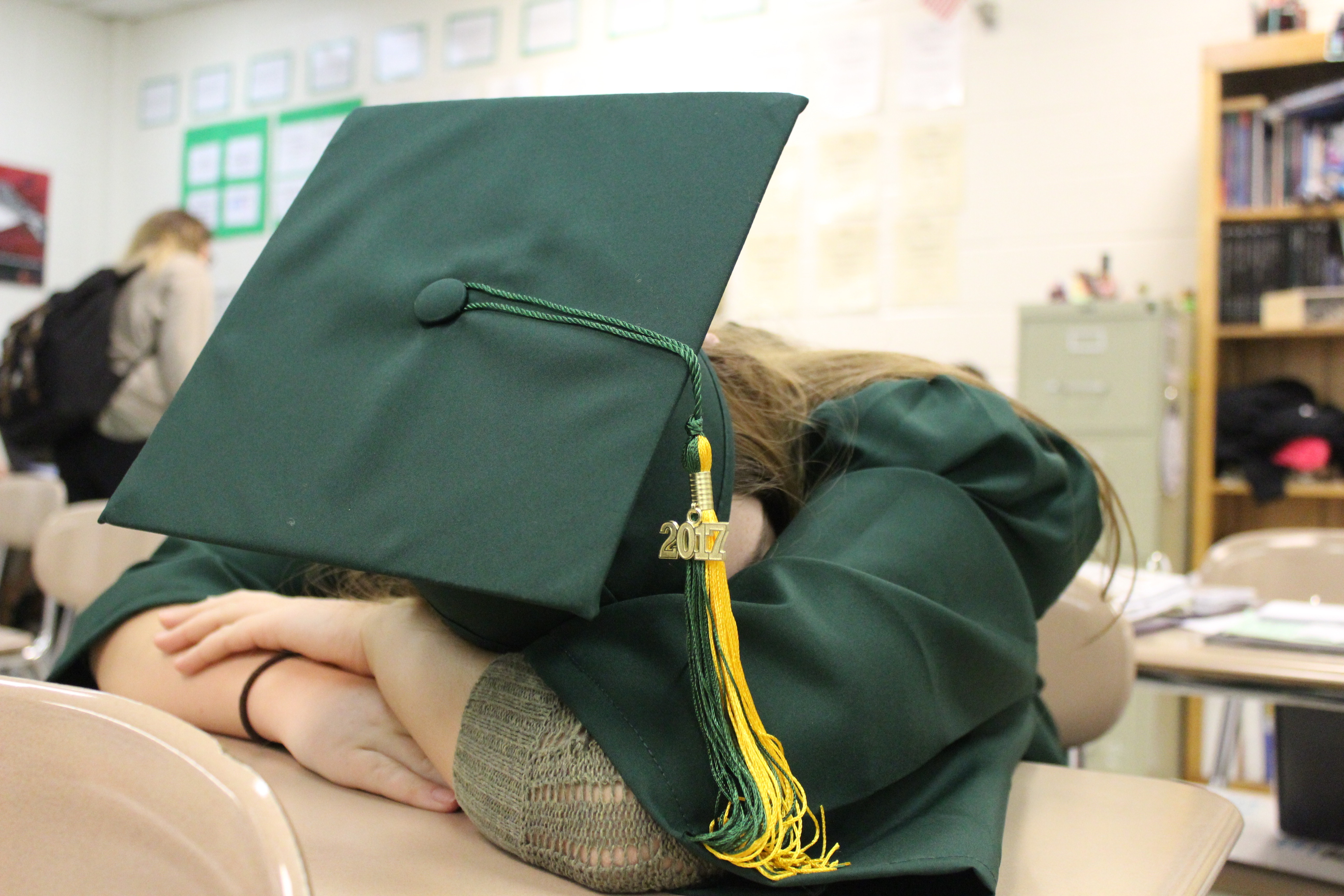“I turn some things in—enough to get a passing grade—but for the most part, I try to slack off wherever I can, because it doesn’t matter as much,” senior Rohan Dash said.
Each year, seniors slowly develop senioritis as their final high school year comes to an end. Senioritis is a “disease” that is characterized by a lack of motivation and continuous absences from school.
Like others in her class, senior Darcy McGregor has experienced senioritis this year. She will attend N.C. State in the fall and will be in the Women In Science and Engineering program. She plans to major in applied mathematics.
“I still make a point to keep my grades good,” McGregor said. “I’m not striving for perfect A’s, however—I am trying to maintain a B [average]. There will be times when I turn in stuff late or I will half-ass it pretty much. There have been a few assignments that I haven’t turned in.”
Senior Zoe Kaegi wishes her teachers would give their students a little break during second semester.
“I’m not even trying to be a lazy student, but sometimes [teachers] need to give children a day to chill out before their brains explode,” Kaegi said. “Because that is where I am at right now—my brain is on the verge of exploding.”
American History teacher Melissa Hayden teaches mostly senior students. She believes that seniors realize that they need to pass their classes for the final semester in high school.
“Ultimately, you are still in school, and you still have responsibilities,“ Hayden said. “Even though kids go through senioritis, they get that and they pick that up, because you have to finish out your year. You don’t have to finish completely strong, but you do have to finish.”
Dash’s grades have dropped since last year, when he had 90s in most of his classes. This year, he has continued to take AP and honors classes. He believes that his grades this semester will not affect his admission into N.C. State.
“It makes me feel like anything I do now doesn’t really matter as much,” Dash said. “Because if it is not going to affect my record as long as I keep going to N.C. State, then what difference does it make whether I make a C or an A?”
Kaegi will also attend N.C. State and plans to major in Biomedical Engineering. She says that she is not bothered by having lower grades than last year.
“I don’t really care,” Kaegi said. “I don’t really notice it either. It is hard to tell if I am just taking really hard courses… or if I am just being lazy.”
McGregor believes that the hardest part of second semester is completing her homework outside of school.
“Especially in the spring semester, [my motivation] has died,” McGregor said. “I dread doing homework. I put it off, and I typically end up doing my homework—if I do it at all—in my online class first period.”
AP Statistics and Discrete Mathematics teacher Jennifer Parks allows her students to pick the topic for their project at the end of the year, which she says keeps them motivated. She also gives her students candy to keep them invested in class.
McGregor has a few teachers who gave less busy work this semester to help seniors stay motivated.
“Some teachers will continue giving the work, just because they expect you to keep giving, even though you are pretty much done,” McGregor said. “Other teachers will understand, and they will talk to you about it. They will ask you if you want to do it, and if the class says no, then [the teacher] will just say, ‘Okay, we will do less of the [busy] work and more actual learning.’”
Hayden keeps her students motivated by giving her students small group projects so they can talk and enjoy being at school. She notices a decline in her senior students’ motivation as the weather becomes warmer.
“As the weather gets nicer, that is what changes motivation,” Hayden said. “Even this group in the beginning was very motivated, but then it seems to be as it gets nicer out, the motivation goes away. But also after spring break too, which is a really nice time to have to be refreshed, it is a downhill turn from there.”
– By Sarah Helen Shepherd



